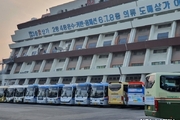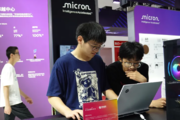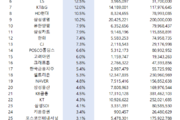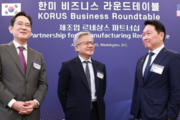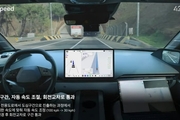
[News Space=Reporter seungwon lee] SYS Retail (CEO Kim Hyung-young, hereinafter referred to as Electronic Land), which once created the legend of home appliance retailers together with Lotte Hi-Mart, is facing significant uncertainty as a going concern after recording deficits for four consecutive years and net losses for three consecutive years last year. In addition, current liabilities are about 80 billion won more than current assets, raising concerns of a liquidity crisis.
According to the audit report of the Financial Supervisory Service's electronic disclosure system on the 7th, E-Land's sales in 2024 decreased by 13% from the previous year's 599.8 billion won to 522 billion won. This is analyzed to be mainly due to the economic downturn and the decrease in consumer demand for home appliances through electronic stores.
Following a deficit of KRW 1.8 billion in 2021, a deficit of KRW 10.9 billion in 2022, and a deficit of KRW 22.8 billion in 2023, the operating loss in 2024 was KRW 17.2 billion, showing a slight improvement year-on-year, but continuing the deficit for the fourth consecutive year.
The net loss also widened from the previous year to KRW 35 billion last year. It will continue to have a net loss for three consecutive years, with a loss of KRW 24.3 billion in 2022 and a loss of KRW 29.7 billion in 2023.
In addition, since the proportion of transactions with special related parties is high, there is a high possibility that independent management activities will be restricted.
The debt ratio is also very high at 217%, and current liabilities (KRW 167.6 billion), including short-term borrowings of KRW 118.5 billion, exceed current assets (KRW 89.8 billion) by KRW 77.8 billion, raising concerns of a liquidity crisis.
In addition, the application of the equity method has been discontinued due to the capital impairment of affiliates, which may have a negative impact on financial stability. The equity method is an accounting method in which a company reflects profits and losses equivalent to the investment share in the financial statements according to the net income and losses of the investee company (affiliate company).
PHU MY DEVELOPMENT JOINT STOCK COMPANY, which SYS Retail invested in, currently has more liabilities than assets, so the company's capital is in minus (capital erosion). In this situation, the company's profits or losses cannot be reflected in SYS Retail's financial statements according to accounting standards. This is called the suspension of the application of the equity method.
An industry financial analysis expert explained, "If the net asset value becomes negative due to capital erosion, the equity method can no longer be applied, and the book value is treated as 0, which shows the financial instability of Electronic Land." He added, "It means that the invested company is recording a serious deficit, so the company's financial status is no longer included in SYS Retail's accounting. It shows that the investment value has virtually disappeared."
Selling and administrative expenses amounted to KRW 147.8 billion, of which KRW 29.8 billion was in salary expenses, KRW 5.8 billion in welfare expenses, KRW 18.4 billion in rent, KRW 22.2 billion in advertising and publicity expenses, and KRW 37.8 billion in commissions.
In addition, a revaluation surplus of KRW 16.1 billion was generated through the revaluation of land and building assets. This is seen as a positive factor reflecting the increase in asset value. Some cost-saving effects were confirmed, such as a decrease in mileage reserve liabilities and improvement in management of recovery reserve liabilities.
According to the opinion recorded in the Electronic Land audit report, "It was accounted for under the assumption that assets and liabilities can be recovered or repaid at their book values through the normal course of business activities. However, a net loss of KRW 34.9 billion occurred in the reporting period ending December 31, 2024, and current liabilities as of December 31, 2024 exceeded current assets by KRW 77.8 billion. This situation raises significant doubts about going concern."
Meanwhile, SYS Retail (Electronic Land) was established on December 4, 1963 as Seoul Electronic Distribution and has been engaged in the wholesale and retail business of electrical and electronic products. On July 1, 2001, the rental business division was spun off and the company name was changed to Electronic Land.
Afterwards, the company changed its name to SYS Retail on January 10, 2012. The head office is located at 74 Cheongpa-ro, Yongsan-gu, Seoul, and currently has 107 branches nationwide, including the Yongsan branch.
Although the paid-in capital was increased to KRW 88.2 billion through capital transfer of the asset revaluation difference, spin-off, and paid-in capital increase, the total capital is still in the negative (-KRW 8.5 billion) due to accumulated deficit.
The actual owner of SYS Holdings is Chairman Hong Bong-cheol, who holds a 63.17% stake in SYS Holdings and is the largest shareholder.
Chairman Hong Bong-cheol's children, Director Hong Won-pyo and Executive Director Hong Yu-seon, are each major shareholders of SYS Retail (SYS Holdings 65.89%, Hong Won-pyo 15.40%, Hong Yu-seon 9.53%, Korea Iron and Steel 4.12%, others 5.06%), and the company is operated under the influence of Chairman Hong Bong-cheol's family.
SYS Retail has been sanctioned by the Fair Trade Commission for unfairly lending money to its major shareholder, SYS Holdings. This case refers to the act of SYS Holdings providing its real estate as collateral for free from 2009 to 2021 to help its affiliate, Electronic Land, borrow large amounts of money at low interest rates. The Fair Trade Commission detected this and imposed a fine, and SYS Holdings and SYS Retail filed an administrative lawsuit, but in 2023, the Seoul High Court ruled that the Fair Trade Commission's disposition was lawful.















